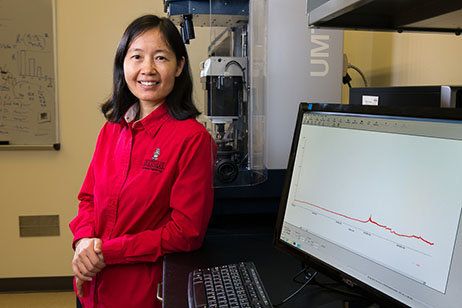University of Arkansas to Lead New Center With Industrial Solutions Focus

Min Zou, Twenty-First Century Professor in Mechanical Engineering, will direct the new Center for Advanced Surface Engineering.
FAYETTEVILLE, Ark. — A new federally funded research center led by the University of Arkansas will partner with Arkansas industries and create new products for use in manufacturing, aerospace and defense, agriculture, forestry, oil and gas, food packaging and health care.
The Center for Advanced Surface Engineering will be funded with a $20 million grant from the National Science Foundation through its Experimental Program to Stimulate Competitive Research (EPSCoR), which promotes scientific progress nationwide by establishing partnerships with government, higher education and industry.
Min Zou, who holds the endowed Twenty-First Century Professorship in Mechanical Engineering at the University of Arkansas, will serve as the center’s director.
“We look forward to showcasing our faculty expertise and ability to develop solutions for our industry partners that will create jobs for the state of Arkansas,” said Jim Rankin, the U of A’s vice provost for research and economic development. “The center will be in good hands under the leadership of Dr. Zou, a nationally recognized scholar in mechanical and surface engineering.”
PLANS INCLUDE START-UP COMPANIES, PRODUCT CREATION
The center will comprise four interdisciplinary research teams made up of about 40 faculty members from 10 Arkansas institutions. The center will feature a curriculum integrated with industry leaders through internships and seminars, providing a unique interdisciplinary educational program for students.
Plans also include establishing start-up companies to commercialize technologies developed by the center, creating new products and new jobs to bolster the knowledge-based economy in Arkansas while also creating a workforce with the specialized skill-sets necessary to sustain industries that can utilize the center’s research.
Center researchers and laboratories will mentor students from high school through graduate school in an integrated science, technology, engineering and mathematics pipeline that feeds directly into the center and out to industry.
The mechanical team will be led by Zou and Ajay Malshe, Distinguished Professor and Twenty-First Century Chair of Materials, Manufacturing and Integrated Systems at the U of A. It will focus on durable, low-friction and self-sharpening multifunctional surfaces. Nanoscale research in this area would be applied to developing low-friction coatings for mechanical systems and self-sharpening coatings for manufacturing tools.
The cellulose team will be co-led by Julie Carrier, a professor of biological and agricultural engineering at the U of A, and will focus on the surface modification of cellulose material for the development of new antimicrobial packaging material, among other applications.
Eight other U of A faculty will conduct research in the center: Jingyi Chen, assistant professor of chemistry and biochemistry; Jamie Hestekin, associate professor of chemical engineering; Jin-Woo Kim, professor of biological and agricultural engineering; Paul Millett, assistant professor of mechanical engineering; Arun Nair, assistant professor of mechanical engineering; Steven Ricke, professor of food sciences; Greg Salamo, Distinguished Professor of of physics; and Shannon Servoss, associate professor of chemical engineering.
The center’s other participating institutions are University of Arkansas System universities in Little Rock, Monticello and Pine Bluff; the University of Arkansas for Medical Sciences; Arkansas State University, the University of Central Arkansas, Southern Arkansas University, Ouachita Baptist University and Philander Smith College.
About the University of Arkansas: The University of Arkansas provides an internationally competitive education for undergraduate and graduate students in more than 200 academic programs. The university contributes new knowledge, economic development, basic and applied research, and creative activity while also providing service to academic and professional disciplines. The Carnegie Foundation classifies the University of Arkansas among only 2 percent of universities in America that have the highest level of research activity. U.S. News & World Report ranks the University of Arkansas among its top American public research universities. Founded in 1871, the University of Arkansas comprises 10 colleges and schools and maintains a low student-to-faculty ratio that promotes personal attention and close mentoring.
Contacts
Jim Rankin, vice provost for research and economic development
Academic Affairs
479-575-2470,
rankinj@uark.edu
Min Zou, Twenty-First Century Professor in Mechanical Engineering
College of Engineering
479-575-6671,
mzou@uark.edu
Chris Branam, research communications writer/editor
University Relations
479-575-4737,
cwbranam@uark.edu